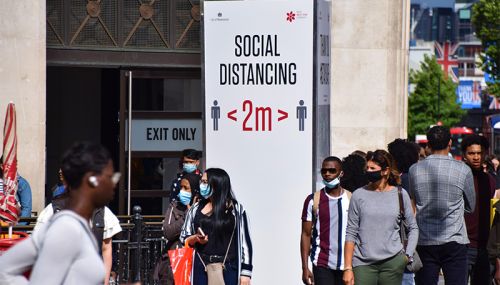CLS wins major new grant to investigate impact of COVID-19
News
1 September 2020

The Centre for Longitudinal Studies (CLS) has secured funding from the Economic and Social Research Council (ESRC), to further its investigation into the immediate and longer term impacts of the COVID-19 pandemic on people in Britain.
The new ESRC grant will enable CLS to build on work it has already undertaken looking at the ways the coronavirus crisis has affected different aspects of people’s lives.
In May, CLS invited participants in all four of its national longitudinal cohort studies to complete an online survey about their experiences during lockdown. Participants in the MRC National Survey of Health and Development, based at the MRC Unit for Lifelong Health and Ageing at UCL, were also asked to take part.
Over 18,000 study members, whose lives have been followed since childhood, completed this first COVID-19 survey, providing invaluable insights into the varying ways the crisis has impacted on five groups of people, aged 19, 30, 50, 62 and 74.
The additional ESRC funding will now enable CLS to carry out two more surveys with members of all five studies, in September 2020 and January 2021. Data collected through these two follow-up surveys will be shared with researchers through the UK Data Service, alongside the data from the first survey, which are already available.
The two follow-up COVID-19 surveys will cover topics from the first survey, including physical health and health behaviours, mental health and wellbeing, time use, family, care, education, work and finances. They will also explore new topics including the schooling experiences of the children of study members.
CLS plans to link the survey data to a range of information about participants’ local environment, including population density, access to local amenities, green spaces, air pollution, and weather. These geo-linkages will create a unique resource which will enable researchers to investigate how people’s local environment can exacerbate or mitigate the impact of the COVID-19 crisis on their lives.
The new grant will also support a programme of research examining how the pandemic has increased already deep-seated economic and health inequalities, using the new COVID-19 survey data alongside the longitudinal information collected from the study participants over many decades.
Director of CLS, Professor, Alissa Goodman, said: “Our longitudinal studies are uniquely placed to answer many important questions about the effects of the COVID-19 crisis on different generations of people in Britain and the role prior life experiences can play in this. By tracking study participants into the future, we will also be creating one of the few resources in the UK which will allow us to understand not only the short-term consequences of the pandemic but also the longer lasting impacts on people’s lives. I’m delighted that we have secured this new funding.”
Pro-Director for Research and Development at the UCL Institute of Education, Alison Fuller, said: “We’re thrilled that ESRC have recognised the value of the COVID-19 Survey in Five National Longitudinal Studies and supported this work in such a competitive funding environment.”
A series of initial findings covering different topics, based on data from the first COVID-19, survey are available to read now on the CLS website.
The second wave of data collection starts in September.
Back to news listing





